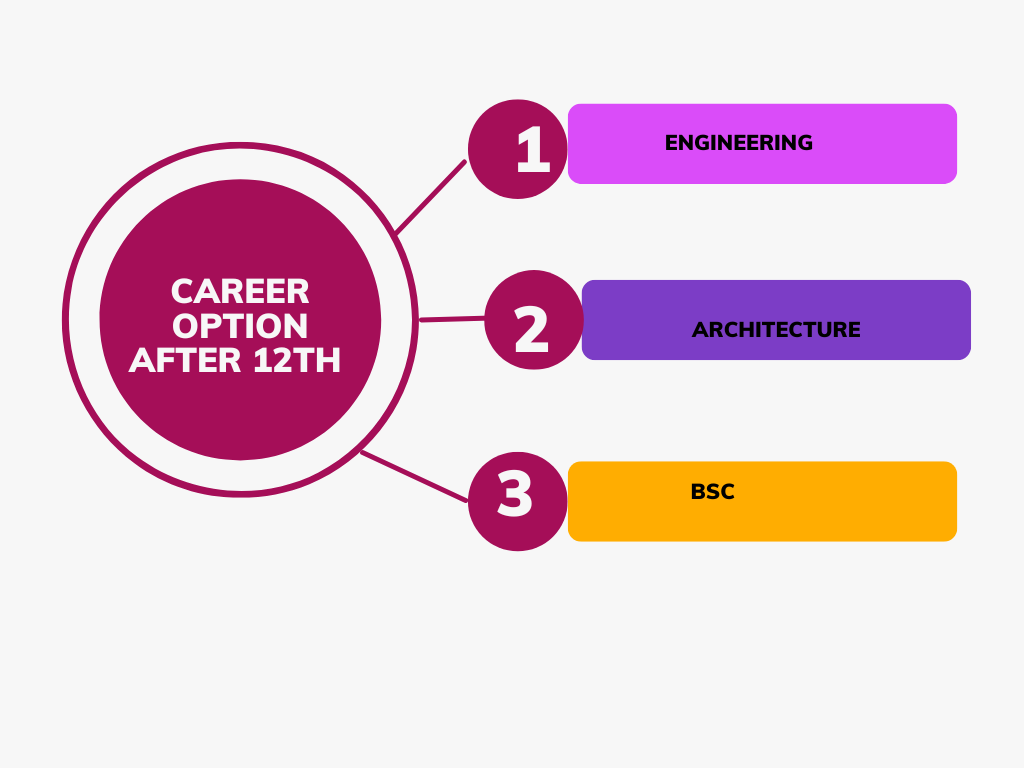Career Options after 12th PCM (Non-Medical), Best Courses, Introduction, Eligibility, Admission, Fee Structure, Top Colleges, Career Opportunities, Future Scope
After completing 12th grade with a PCM (Physics, Chemistry, Mathematics) background, students have a range of exciting Career Options after 12th PCM (non- medical) and courses to choose from. Popular pathways include B. Tech in various engineering disciplines (such as Computer Science, Mechanical, Electrical, and Civil Engineering), B. Arch for those interested in architecture and design, and BSc programs in fields like Physics, Mathematics, or Computer Science for those inclined towards research and academia. Other options include BCA (Bachelor of Computer Applications), Diploma courses in Engineering, and Data Science for a more specialized approach to technology. This foundation in science and mathematics equips students to pursue diverse career paths that align with their interests and offer rewarding growth opportunities in today’s technology-driven world.

Engineering

Table of Contents

Choosing career options after 12th PCM (non-medical) is one of the most significant decisions in a student’s life. For those with a passion for technology, innovation, and problem-solving, pursuing a B. Tech in Electronics and Communication Engineering (ECE) can be a promising option. This article provides an in-depth overview of why B. Tech in ECE is a right choice and explores various career paths available for ECE graduates.
Key Benefits of Choosing B. Tech in ECE
1. Versatile Curriculum: ECE combines electronics, signal processing, embedded systems, VLSI (Very-Large-Scale Integration), and communications. It provides a well-rounded education that equips you with technical expertise and adaptability to various industries.
2. High Demand across Industries: The demand for ECE engineers spans various sectors such as telecommunications, IT, manufacturing, defense, healthcare, and consumer electronics. With the rapid growth of the Internet of Things (IoT) and advancements in communication technologies like 5G, ECE graduates find themselves in high demand.
3. Future-Ready Skillset: As industries increasingly rely on automation, machine learning, and AI-driven solutions, ECE professionals are at the forefront of designing and implementing the technologies that power smart devices and communication systems.
Admission Process
- Entrance Exams: Entrance exams are conducted by some top institutes like JEE Main, JEE Advanced, BITSAT, VITEEE, or the state entrance exam like KCET, MHT CET or WBJEE.
- Eligibility: 12th class passed with PCM group. Minimum Aggregate Percentage generally 50-60% in 12th class, according to the institute.
- Counseling: Based on test scores, students participate in a centralized counseling
process to secure a seat in a engineering colleges.
Fee Structure
- Government Colleges: INR 50,000 – 2,50,000 for the entire course.
- Private Colleges: INR 3,00,000 – 12,00,000 for the entire course.
- Deemed Universities: INR 4,00,000 – 15,00,000 for the entire course.
Top Colleges
- Indian Institute of Technology (IIT), Bombay
- National Institute of Technology (NIT), Trichy
- Birla Institute of Technology and Science (BITS), Pilani
- Vellore Institute of Technology (VIT), Vellore
- Delhi Technological University (DTU), Delhi
Scope
A B. Tech in Electronics and Communication Engineering (ECE) offers diverse career opportunities in fields like telecommunications, embedded systems, and IoT. ECE graduates are in demand across industries including IT, defense, and automotive for roles in design, development, and research. With growing advancements in 5G, AI, and automation, ECE professionals have a strong scope for innovation and long-term career growth. So, this course can be one of the best Career Options after 12th PCM for those with electronics as well as communication mindset.

B. Tech CSE /B. Tech in Computer Science (CSE) is one of the most popular Career Options after 12th PCM (Non-Medical) in India. Given the growth of the digital economy and tech-oriented industries, graduates in CSE are highly sought after in various fields, including IT, finance, healthcare, telecommunications and government sectors. The program emphasizes programming, software development, algorithms, data structures, artificial intelligence, and more. This guide will explore every aspect of B. Tech in CSE in India, covering courses, colleges, fee structures, eligibility criteria, and career prospects after graduation.
Key Benefits of Choosing B. Tech in CSE
-
High Demand and Job Security: Tech roles are consistently in demand, offering stable and rewarding careers in both the private and public sectors.
-
Wide Career Options: Graduates can pursue roles like software developer, data scientist, AI engineer, and cybersecurity analyst. The flexibility also allows movement across various tech domains.
-
Competitive Salaries: CSE graduates are among the highest-paid engineers, with salaries increasing substantially with specialization and experience.
-
Emerging Technologies: CSE offers opportunities to work in innovative fields like AI, Internet of Things (IoT), blockchain, and VR/AR, keeping skills relevant in a fast-evolving industry.
-
Problem-Solving Skills: The degree fosters critical thinking and problem-solving skills, making graduates valuable in technical and managerial roles.
-
Entrepreneurial Potential: CSE graduates often pursue entrepreneurship, launching startups in areas like app development, tech consulting, and digital solutions.
-
Global Career Opportunities: CSE skills are universally in demand, allowing graduates to work in tech hubs worldwide or remotely.
-
Pathway for Higher Studies: Many graduates pursue further studies like MS, M.Tech, or Ph.D., or specialize in fields such as data science and AI, leading to advanced research and innovation making it one of the best career options after 12th PCM.
-
Comprehensive Curriculum and Hands-On Training: Programs cover essential skills in programming, algorithms, and databases, with added hands-on projects and internships for industry readiness.
Admission Process
- Entrance Exams: Entrance exams are conducted by some top institutes like JEE Main, JEE Advanced, BITSAT, VITEEE, or the state entrance exam like KCET, MHT CET or WBJEE.
- Eligibility:12th class passed with PCM group. Minimum Aggregate Percentage generally 50-60% in 12th class, according to the institute.
- Counseling: Based on test scores, students participate in a centralized counseling
process to secure a seat in a engineering colleges.
Fee Structure
- Government Colleges: INR 50,000 – 2,50,000 for the entire course.
- Private Colleges: INR 3,00,000 – 12,00,000 for the entire course.
- Deemed Universities: INR 4,00,000 – 15,00,000 for the entire course.
Top Colleges
- Indian Institute of Technology (IIT), Bombay
- National Institute of Technology (NIT), Trichy
- Birla Institute of Technology and Science (BITS), Pilani
- Vellore Institute of Technology (VIT), Vellore
- Delhi Technological University (DTU), Delhi
Scope
A B. Tech in Computer Science Engineering (CSE) offers versatile career paths in software development, data science, AI, and cybersecurity, with high demand across sectors like finance, healthcare, and tech. With continuous advancements in fields like cloud computing and IoT, CSE graduates enjoy strong career growth and competitive salaries. So this course one of the best Career Options after 12th PCM.

B. Tech in Mechanical Engineering (ME) stands as one of the most established and versatile Career Options after 12th PCM (Non-Medical) in India. Its curriculum focuses on the design, development, and maintenance of mechanical systems, which include vehicles, aircraft, machinery, and infrastructure. Mechanical engineers are vital players across a multitude of industries, including automotive, aerospace, energy, manufacturing, and robotics.
Key Benefits of Choosing B. Tech in Mechanical Engineering
Wide Range of Career Opportunities: Mechanical engineers are needed in various sectors, including automotive, aerospace, energy, manufacturing, robotics, and construction. The versatility of this degree provides a broad range of career paths.
High Demand Across Industries: As the world continues to industrialize and innovate, mechanical engineers are in high demand to design, maintain, and improve everything from engines and machines to complex manufacturing systems.
Strong Earning Potential: Mechanical engineering offers competitive starting salaries, which increase with experience and specialization. Roles in fields like aerospace, oil and gas, and automotive R&D are particularly well-paying.
Hands-On and Practical Learning: Mechanical engineering programs are highly practical, offering students opportunities to work on real-world projects and internships, where they gain experience with machinery, manufacturing processes, and CAD software.
Innovative and Creative Field: Mechanical engineers work on problem-solving and creating solutions, designing systems and products that impact daily life, from vehicles and appliances to renewable energy solutions.
Foundation for Emerging Fields: With a B. Tech in Mechanical Engineering, graduates can specialize further in emerging areas such as robotics, automation, renewable energy, nanotechnology, and materials science, all of which are growing fields with strong job prospects.
Pathway to Higher Studies and Research: Mechanical engineering graduates have the option to pursue advanced degrees (M.Tech, MS, or Ph.D.) in specialized fields like thermodynamics, fluid mechanics, or automotive engineering, opening doors to R&D roles and academia.
Global Career Opportunities: Mechanical engineers are in demand worldwide, especially in industrialized nations, where they contribute to sectors like automotive, aerospace, and energy, making this a globally viable career choice.
Admission Process
- Entrance Exams: Entrance exams are conducted by some top institutes like JEE Main, JEE Advanced, BITSAT, VITEEE, or the state entrance exam like KCET, MHT CET or WBJEE.
- Eligibility:12th class passed with PCM group. Minimum Aggregate Percentage generally 50-60% in 12th class, according to the institute.
- Counseling: Based on test scores, students participate in a centralized counseling
process to secure a seat in a engineering colleges.
Fee Structure
- Government Colleges: INR 50,000 – 2,50,000 for the entire course.
- Private Colleges: INR 3,00,000 – 12,00,000 for the entire course.
- Deemed Universities: INR 4,00,000 – 15,00,000 for the entire course.
Top Colleges
- Indian Institute of Technology (IIT), Bombay
- National Institute of Technology (NIT), Trichy
- Birla Institute of Technology and Science (BITS), Pilani
- Vellore Institute of Technology (VIT), Vellore
- Delhi Technological University (DTU), Delhi
Scope
Mechanical engineering offers vast career opportunities in industries like automotive, aerospace, energy, and manufacturing, focusing on the design, development, and maintenance of machinery and systems. With advancements in automation, robotics, and renewable energy, mechanical engineers are in high demand globally, providing strong career growth and specialization options. So, this course can be one of the best Career Options after 12th PCM for those with mechanical mindset.
Eligibility
Fee Structure
Entrance Exam
12th PCM with 50% marks
- Government Colleges: INR 20,000 to 2,00,000 per year; IITs, NITs, and state-run universities are examples.
- Private Colleges: INR 1,00,000 to 4,00,000
JEE Main, JEE Advanced, BITSAT, VITEEE, or the state entrance exam like KCET, MHT CET or WBJEE.

B. Tech in Information Technology (IT) is among the most sought career options after 12th PCM (Non-Medical) in India. It aims to equip students with the skills needed to manage, process, and safeguard information across various formats, including data networks, databases, and software applications. In our digital age, the IT industry plays a crucial role, presenting a wide array of career opportunities in both public and private sectors. This guide outlines the structure of the B. Tech IT course, leading colleges, eligibility requirements, fee details, and potential career paths and why this course is one of the best career options after 12th PCM.
Key Benefits of Choosing B. Tech in IT
High Demand in a Digital World: With businesses moving online and data becoming central to decision-making, IT professionals are in constant demand. From e-commerce to healthcare, IT graduates find opportunities across sectors.
Diverse Career Paths: IT graduates can work as software developers, database administrators, system analysts, network architects, cybersecurity specialists, and more, allowing for flexibility in career choices.
Competitive Salaries and Growth Potential: IT is one of the highest-paying engineering fields. Roles in software development, data science, and cybersecurity offer competitive starting salaries and significant potential for growth as skills advance.
Hands-On Learning with Real-World Applications: B. Tech IT programs emphasize practical learning through projects, internships, and labs, enabling students to gain hands-on experience in programming, database management, and network design.
Global Career Opportunities and Remote Work Options: The skills learned in IT are in demand worldwide. Many IT roles offer remote work options, giving professionals the flexibility to work for global companies from anywhere.
Foundation for Specialization in Emerging Technologies: A B. Tech in IT provides a solid foundation for further specialization in fields like cloud computing, artificial intelligence, blockchain, and cybersecurity, which are highly valued in today’s tech industry.
Pathway to Entrepreneurship: IT graduates with entrepreneurial ambitions can start their own tech ventures or freelancing businesses, using skills in software development, app creation, and IT consulting.
Admission Process
- Entrance Exams: Entrance exams are conducted by some top institutes like JEE Main, JEE Advanced, BITSAT, VITEEE, or the state entrance exam like KCET, MHT CET or WBJEE.
- Eligibility:12th class passed with PCM group. Minimum Aggregate Percentage generally 50-60% in 12th class, according to the institute.
- Counseling: Based on test scores, students participate in a centralized counseling
process to secure a seat in a engineering colleges.
Fee Structure
- Government Colleges: INR 50,000 – 2,50,000 for the entire course.
- Private Colleges: INR 3,00,000 – 12,00,000 for the entire course.
- Deemed Universities: INR 4,00,000 – 15,00,000 for the entire course.
Top Colleges
- Indian Institute of Technology (IIT), Bombay
- National Institute of Technology (NIT), Trichy
- Birla Institute of Technology and Science (BITS), Pilani
- Vellore Institute of Technology (VIT), Vellore
- Delhi Technological University (DTU), Delhi
Scope
Eligibility
Fee Structure
Entrance Exam
12th PCM with 50% marks
- Government Colleges: INR 20,000 to 2,00,000 per year; IITs, NITs, and state-run universities are examples.
- Private Colleges: INR 1,00,000 to 4,00,000
JEE Main, JEE Advanced, BITSAT, VITEEE, or the state entrance exam like KCET, MHT CET or WBJEE.

Civil Engineering is one of the oldest and most prominent branches of engineering, dealing with the design, construction, and maintenance of physical and naturally built environments like roads, bridges, canals, dams, and buildings. A B. Tech in Civil Engineering equips students with the technical skills to work on large infrastructure projects, making it a career full of exciting challenges and diverse opportunities. With a growing focus on sustainable infrastructure and smart cities, civil engineering has a promising future career options after 12th PCM (Non-Medical) for aspirants who want to contribute to nation-building.
Key Benefits of Choosing B. Tech in CIVIL Engineering
High Demand for Infrastructure Development: Civil engineers are essential for the planning, construction, and maintenance of infrastructure. With rapid urbanization, there’s a continuous demand for skilled civil engineers to design and build sustainable cities, transport systems, and essential facilities.
Wide Range of Career Opportunities: Civil engineers have diverse career options in areas like structural engineering, environmental engineering, construction management, transportation engineering, and geotechnical engineering. This flexibility allows graduates to explore different fields and find areas of interest.
Job Stability and Growth Potential: Civil engineering offers job stability, especially in the public sector, with projects funded by government bodies. With experience and additional certifications, civil engineers can advance to managerial and leadership roles.
Hands-On, Practical Learning: Civil engineering programs emphasize practical training through labs, fieldwork, and site visits. This hands-on experience prepares students to manage real-world engineering challenges, from designing buildings to supervising construction sites.
High Earning Potential in Established and Growing Markets: While entry-level salaries are competitive, civil engineers’ earning potential grows substantially with experience, particularly in specialized areas like structural engineering, project management, and environmental engineering.
Opportunities to Work on Large-Scale, Impactful Projects: Civil engineers often work on projects that visibly shape communities, such as highways, airports, hospitals, and water treatment plants. This makes the profession highly rewarding for those who want to see the tangible impact of their work.
Pathway to Specialization and Higher Studies: A B. Tech in Civil Engineering provides a strong foundation for further studies in specialized fields like structural engineering, transportation planning, or environmental engineering. Graduates can pursue M.Tech, MS, or even Ph.D. programs to deepen expertise and access R&D roles.
Global Career Prospects: Civil engineers are needed worldwide for infrastructure projects, making it a viable career for those interested in international opportunities. Skills learned in civil engineering are transferable and valued across global markets.
Contribution to Sustainable Development: With the rise of eco-friendly practices, civil engineers are increasingly involved in sustainable development, green buildings, and renewable infrastructure. Civil engineers can make a positive impact on the environment through their work.
Admission Process
- Entrance Exams: Entrance exams are conducted by some top institutes like JEE Main, JEE Advanced, BITSAT, VITEEE, or the state entrance exam like KCET, MHT CET or WBJEE.
- Eligibility:12th class passed with PCM group. Minimum Aggregate Percentage generally 50-60% in 12th class, according to the institute.
- Counseling: Based on test scores, students participate in a centralized counseling
process to secure a seat in a engineering colleges.
Fee Structure
- Government Colleges: INR 50,000 – 2,50,000 for the entire course.
- Private Colleges: INR 3,00,000 – 12,00,000 for the entire course.
- Deemed Universities: INR 4,00,000 – 15,00,000 for the entire course.
Top Colleges
- Indian Institute of Technology (IIT), Bombay
- National Institute of Technology (NIT), Trichy
- Birla Institute of Technology and Science (BITS), Pilani
- Vellore Institute of Technology (VIT), Vellore
- Delhi Technological University (DTU), Delhi
Scope
Eligibility
Fee Structure
Entrance Exam
12th PCM with 50% marks
- Government Colleges: INR 20,000 to 2,00,000 per year; IITs, NITs, and state-run universities are examples.
- Private Colleges: INR 1,00,000 to 4,00,000
JEE Main, JEE Advanced, BITSAT, VITEEE, or the state entrance exam like KCET, MHT CET or WBJEE.

B. Tech in Electrical Engineering is a highly respected undergraduate program that focuses on the study of electrical systems, electromagnetism, electronics, and their applications in real-world systems. As a foundational branch of engineering, it offers a strong academic background and practical skills that are essential for various industries, including power generation, automation, telecommunications, and more. With the rapid advancement in technology and increasing demand for efficient electrical solutions, the scope of electrical engineering has expanded significantly, offering numerous career options after 12th PCM (Non-Medical) in both the public and private sectors.
Key Benefits of Choosing B. Tech in Electrical Engineering
High Demand Across Industries: Electrical engineers are needed in various sectors, including power generation, renewable energy, electronics, manufacturing, telecommunications, and automation. This broad demand ensures diverse career options and opportunities for specialization.
Competitive Salaries and Growth Potential: Electrical engineers earn competitive starting salaries that increase with experience and specialization. Fields like renewable energy, electronics, and automation offer particularly lucrative roles as technology advances.
Diverse Career Paths: Electrical engineering graduates can work in a wide range of roles, such as power systems engineer, electronics engineer, automation engineer, and control systems engineer. This flexibility allows graduates to explore multiple industries and job functions.
Contributing to Renewable and Sustainable Energy: With the global push for renewable energy, electrical engineers are at the forefront of developing and managing energy-efficient solutions like solar, wind, and smart grid technology. Electrical engineering offers the chance to work on projects with significant environmental benefits.
Hands-On Learning with Practical Applications: B. Tech in Electrical Engineering programs emphasize practical training through labs, industry projects, and internships, allowing students to work with electrical systems, circuit design, and control systems hands-on.
Strong Foundation in Core and Emerging Technologies: The curriculum includes core subjects like circuit theory, electromagnetics, and power electronics, as well as courses in emerging areas like IoT, robotics, and AI integration, which are highly relevant to today’s technological landscape.
Global Career Opportunities: Electrical engineering skills are universally applicable, opening up international career opportunities in industrialized countries where power systems, electronics manufacturing, and automation are crucial industries which makes this course one of the good career options after 12th PCM.
Admission Process
- Entrance Exams: Entrance exams are conducted by some top institutes like JEE Main, JEE Advanced, BITSAT, VITEEE, or the state entrance exam like KCET, MHT CET or WBJEE.
- Eligibility:12th class passed with PCM group. Minimum Aggregate Percentage generally 50-60% in 12th class, according to the institute.
- Counseling: Based on test scores, students participate in a centralized counseling
process to secure a seat in a engineering colleges.
Fee Structure
- Government Colleges: INR 50,000 – 2,50,000 for the entire course.
- Private Colleges: INR 3,00,000 – 12,00,000 for the entire course.
- Deemed Universities: INR 4,00,000 – 15,00,000 for the entire course.
Top Colleges
- Indian Institute of Technology (IIT), Bombay
- National Institute of Technology (NIT), Trichy
- Birla Institute of Technology and Science (BITS), Pilani
- Vellore Institute of Technology (VIT), Vellore
- Delhi Technological University (DTU), Delhi
Scope
A B. Tech in IT offers promising career opportunities in software development, data science, cybersecurity, and IT consulting, with high demand across various industries. Graduates can secure roles in both tech-focused companies and IT departments of other sectors, benefiting from strong job growth and competitive salaries. So, this course can be one of the best Career Options after 12th PCM for those interested in electrical circuits.
Eligibility
Fee Structure
Entrance Exam
12th PCM with 50% marks
- Government Colleges: INR 20,000 to 2,00,000 per year; IITs, NITs, and state-run universities are examples.
- Private Colleges: INR 1,00,000 to 4,00,000
JEE Main, JEE Advanced, BITSAT, VITEEE, or the state entrance exam like KCET, MHT CET or WBJEE.

B. Tech in Chemical Engineering is an interdisciplinary branch of engineering that amalgamates principles of chemistry, physics, mathematics, biology, and economics to make the processes of energy and material utilization efficient, effective design, transportation, and transformation. A B. Tech in Chemical Engineering opens up many career options after 12th PCM (Non-Medical) for students in sectors like petrochemicals, pharmaceuticals, food processing, energy, and more. Chemical engineers play a vital role in solving some of the world’s most pressing challenges with growing important sustainable development and green technologies.
Key Benefits of Choosing B. Tech in Chemical Engineering
High Demand in Diverse Industries: Chemical engineers are essential to industries like pharmaceuticals, petrochemicals, food and beverage, environmental technology, and renewable energy. This broad demand offers chemical engineers versatile career options after 12th PCM.
Competitive Salary and Job Growth: Chemical engineers often start with competitive salaries, which grow with experience and specialization. Fields like biotechnology, process engineering, and materials science provide lucrative roles, especially for those with advanced technical expertise.
Wide Range of Career Opportunities: B. Tech in Chemical Engineering opens doors to roles such as process engineer, environmental engineer, safety engineer, production manager, and quality control specialist. This flexibility allows graduates to work across various industries and roles.
Focus on Innovation and Sustainable Solutions: Chemical engineers play a significant role in developing eco-friendly and sustainable processes. From renewable energy production to waste management, chemical engineers are at the forefront of creating processes that minimize environmental impact.
Hands-On Learning and Practical Skills Development: The curriculum in chemical engineering includes laboratory work, simulations, and industry projects that provide hands-on experience in areas like chemical reactions, fluid dynamics, and material properties.
Strong Foundation for Specialization in Emerging Fields: Chemical engineering graduates can specialize in fields like nanotechnology, biotechnology, energy systems, and environmental engineering, which are growing rapidly and offer strong career prospects.
Global Career Prospects: Chemical engineering skills are transferable worldwide, and industries such as oil and gas, pharmaceuticals, and food production need chemical engineers globally. Many graduates find opportunities to work with multinational companies or even relocate abroad for specialized roles.
Admission Process
- Entrance Exams: Entrance exams are conducted by some top institutes like JEE Main, JEE Advanced, BITSAT, VITEEE, or the state entrance exam like KCET, MHT CET or WBJEE.
- Eligibility:12th class passed with PCM group. Minimum Aggregate Percentage generally 50-60% in 12th class, according to the institute.
- Counseling: Based on test scores, students participate in a centralized counseling
process to secure a seat in a engineering colleges.
Fee Structure
- Government Colleges: INR 50,000 – 2,50,000 for the entire course.
- Private Colleges: INR 3,00,000 – 12,00,000 for the entire course.
- Deemed Universities: INR 4,00,000 – 15,00,000 for the entire course.
Top Colleges
- Indian Institute of Technology (IIT), Bombay
- National Institute of Technology (NIT), Trichy
- Birla Institute of Technology and Science (BITS), Pilani
- Vellore Institute of Technology (VIT), Vellore
- Delhi Technological University (DTU), Delhi
Scope
A B. Tech in Chemical Engineering opens doors to careers in diverse fields like pharmaceuticals, energy, and environmental engineering, focusing on process design and optimization. Graduates can work in roles related to research, production, and safety, with ample opportunities in both private and government sectors. So, this course is one of the good career options after 12th PCM.
Eligibility
Fee Structure
Entrance Exam
12th PCM with 50% marks
- Government Colleges: INR 20,000 to 2,00,000 per year; IITs, NITs, and state-run universities are examples.
- Private Colleges: INR 1,00,000 to 4,00,000
JEE Main, JEE Advanced, BITSAT, VITEEE, or the state entrance exam like KCET, MHT CET or WBJEE.

Bachelor of technology in Aerospace Engineering is the most advanced and high-tech branch of engineering and a top-rated career options after 12th PCM (Non-Medical), mainly dealing with the designing, building, and maintaining aircraft, spacecraft, or other aerial vehicles, and their associated systems. It involves interdisciplinary studies of aerodynamics, avionics, propulsion, materials science, and many other things. A B. Tech in Aerospace Engineering opens up a world of opportunities in industries like defense, aviation, space research, and even emerging sectors like drone technology and urban air mobility. The future of space exploration and green aviation technologies is going to play an incredibly pivotal role with the hands of aerospace engineers.
Key Benefits of Choosing B. Tech in Aerospace Engineering
Exciting and Specialized Field of Study: Aerospace engineering is a unique and specialized branch of engineering that delves into the science of flight and space exploration. It’s perfect for students who are passionate about aviation, aerodynamics, and the mechanics of flight.
Wide Range of Career Opportunities: Aerospace engineers have diverse job opportunities in areas such as aircraft design, satellite development, propulsion systems, space exploration, and defense. Graduates can work in both the civil aviation industry and government sectors, such as defense and space research.
High Demand in Growing Industries: With advancements in drone technology, commercial space travel, and defense, there’s an increasing demand for skilled aerospace engineers. Organizations like ISRO, DRDO, HAL, and private companies in the aerospace sector require trained professionals to work on high-tech projects.
Competitive Salaries and Long-Term Growth: Aerospace engineering offers competitive salaries, especially in research and development, defense, and space exploration sectors. Salaries increase significantly with experience and specialization, making it a financially rewarding career options after 12th PCM.
Hands-On Experience and Practical Skills Development: Aerospace engineering programs emphasize hands-on learning through laboratory work, simulations, internships, and projects. Students gain practical skills in areas such as aerodynamics, fluid mechanics, propulsion, and structural analysis, making them job-ready upon graduation.
Opportunity to Work on Cutting-Edge Technology: Aerospace engineers often work on state-of-the-art technology and innovation, including aircraft design, satellite communication systems, autonomous drones, and space exploration missions. This field offers the chance to contribute to groundbreaking projects.
Pathway to Specialized Fields and Research: Graduates can further specialize in fields like avionics, space systems, propulsion, and materials science. For those interested in research and academia, aerospace engineering provides a strong foundation for pursuing an M.Tech, MS, or Ph.D. in advanced areas like aerodynamics or space engineering which makes it one of the good career options after 12th PCM..
Admission Process
- Entrance Exams: Entrance exams are conducted by some top institutes like JEE Main, JEE Advanced, BITSAT, VITEEE, or the state entrance exam like KCET, MHT CET or WBJEE.
- Eligibility:12th class passed with PCM group. Minimum Aggregate Percentage generally 50-60% in 12th class, according to the institute.
- Counseling: Based on test scores, students participate in a centralized counseling
process to secure a seat in a engineering colleges.
Fee Structure
- Government Colleges: INR 50,000 – 2,50,000 for the entire course.
- Private Colleges: INR 3,00,000 – 12,00,000 for the entire course.
- Deemed Universities: INR 4,00,000 – 15,00,000 for the entire course.
Top Colleges
- Indian Institute of Technology (IIT), Bombay
- National Institute of Technology (NIT), Trichy
- Birla Institute of Technology and Science (BITS), Pilani
- Vellore Institute of Technology (VIT), Vellore
- Delhi Technological University (DTU), Delhi
Scope
A B. Tech in Aerospace Engineering offers career opportunities in aircraft and spacecraft design, defense, and aviation industries, focusing on innovation and advanced technology. Graduates can work in roles like aerospace designer, research analyst, or flight systems engineer, with opportunities in both government and private sectors.Due to its vast scopes this course could be a good career options after 12th PCM.
Eligibility
Fee Structure
Entrance Exam
12th PCM with 50% marks
- Government Colleges: INR 20,000 to 2,00,000 per year; IITs, NITs, and state-run universities are examples.
- Private Colleges: INR 1,00,000 to 4,00,000
JEE Main, JEE Advanced, BITSAT, VITEEE, or the state entrance exam like KCET, MHT CET or WBJEE.

Bachelor of Technology in Artificial Intelligence and Machine Learning (B. Tech AIML) is a trusted career options after 12th PCM. From the self-driving car to predictive algorithms in health care, it is transforming industries and is opening up new avenues of innovation. For students who are passing 12th grade under the Science stream, this B. Tech in Artificial Intelligence and Machine Learning offers the most exciting and future-proof career. The degree with a curriculum of programming, data science, robotics, and automation form a good foundation for different high-demand roles in the tech sector.
Key Benefits of Choosing B. Tech in AIML
- Huge demand in AI Skills: There is massive demand in the tech arena, especially in AI and ML; most companies in this regard actively look for talent in all sectors.
- High Salary Potential: Most roles in AI and ML tend to be high paid within the tech industries. More importantly, this sector tends to advance your career really fast.
- Innovation and Problem Solving: AI and ML involve designing intelligent solutions to real-world problems. Thus, it would appeal to those interested in creative and analytical challenges.
- Global Opportunities: The skilled AI and ML graduates are in great demand in the world. One will have opportunities in both developing and developed countries that makes it a one good career options after 12th PCM.
Admission Process
- Entrance Exams: Entrance exams are conducted by some top institutes like JEE Main, JEE Advanced, BITSAT, VITEEE, or the state entrance exam like KCET, MHT CET or WBJEE.
- Eligibility: 12th class passed with PCM group. Minimum Aggregate Percentage generally 50-60% in 12th class, according to the institute.
- Counseling: Based on test scores, students participate in a centralized counseling
process to secure a seat in a engineering colleges.
Fee Structure
- Government Colleges: INR 50,000 – 2,50,000 for the entire course.
- Private Colleges: INR 3,00,000 – 12,00,000 for the entire course.
- Deemed Universities: INR 4,00,000 – 15,00,000 for the entire course.
Top Colleges
- Indian Institutes of Technology (IITs)
- International Institute of Information Technology (IIIT
- Vellore Institute of Technology (VIT
- Manipal Institute of Technology (MIT
- SRM Institute of Science and Technology (Chennai)
Scope
AI is revolutionizing healthcare through predictive diagnosis, personalized medicine, and drug discovery. Industries are adopting AI in robotics for assembly lines, quality control, and predictive maintenance. There has been an increasing focus on the development of transparent AI models to enhance accountability and trust.AI models are widely used in fraud detection, loan approvals, and personalized education. So, this course can be one of the best Career Options after 12th PCM.
Eligibility
Fee Structure
Entrance Exam
12th PCM with 50% marks
- Government Colleges: INR 20,000 to 2,00,000 per year; IITs, NITs, and state-run universities are examples.
- Private Colleges: INR 1,00,000 to 4,00,000
JEE Main, JEE Advanced, BITSAT, VITEEE, or the state entrance exam like KCET, MHT CET or WBJEE.
| JOIN Whatsapp | CLICK HERE |
|---|---|
| JOIN Telegram | CLICK HERE |
| JOIN Facebook | CLICK HERE |
| JOIN Instagram | CLICK HERE |
Join Our Groups and Pages
- Join Our WhatsApp Group: WHATSAPP GROUP
- Join our Facebook Page: JOIN FACEBOOK
- Join our Instagram Page: JOIN INSTAGRAM
- Join our Telegram Group: JOIN TELEGRAM
We provide information related to latest jobs in Haryana, Chandigarh, Punjab, Himachal and all India. To get any information about latest jobs can check our website link www.claimyourjob.com. You can get latest information about jobs, previous year question papers, and general knowledge questions current affair on our website. To get immediate update about various latest notifications you should join our WhatsApp group, Telegram group, Facebook page, Instagram page. If you are preparing for any of government exam then you should join these above mentioned groups and pages. Links are mentioned below.
हमारे ग्रुप और पेज से जुड़ें
- हमारा WhatsApp ग्रुप जॉइन करें: WHATSAPP GROUP
- हमारा Facebook पेज जॉइन करें: JOIN FACEBOOK
- हमारा Instagram पेज जॉइन करें: JOIN INSTAGRAM
- हमारा Telegram ग्रुप जॉइन करें: JOIN TELEGRAM
नवीनतम नौकरियों की जानकारी के लिए, विशेष रूप से हरियाणा, चंडीगढ़, पंजाब, हिमाचल प्रदेश और पूरे भारत में उपलब्ध नौकरियों की जानकारी प्राप्त करने के लिए, आप हमारी वेबसाइट www.claimyourjob.com पर जा सकते हैं।
हमारी वेबसाइट पर आपको नवीनतम सरकारी नौकरियों की जानकारी, पिछले वर्षों के प्रश्न पत्र, सामान्य ज्ञान के प्रश्न और समसामयिक घटनाक्रम (करंट अफेयर्स) से जुड़ी महत्वपूर्ण जानकारी मिलेगी। यदि आप नवीनतम नौकरी अधिसूचनाओं (latest job notifications) की त्वरित अपडेट चाहते हैं, तो हमारे WhatsApp group, Telegram group, Facebook page, Instagram page से जुड़ें।
यदि आप किसी भी सरकारी परीक्षा की तैयारी कर रहे हैं, तो आपको इन ग्रुप्स और पेजेज को अवश्य जॉइन करना चाहिए।
